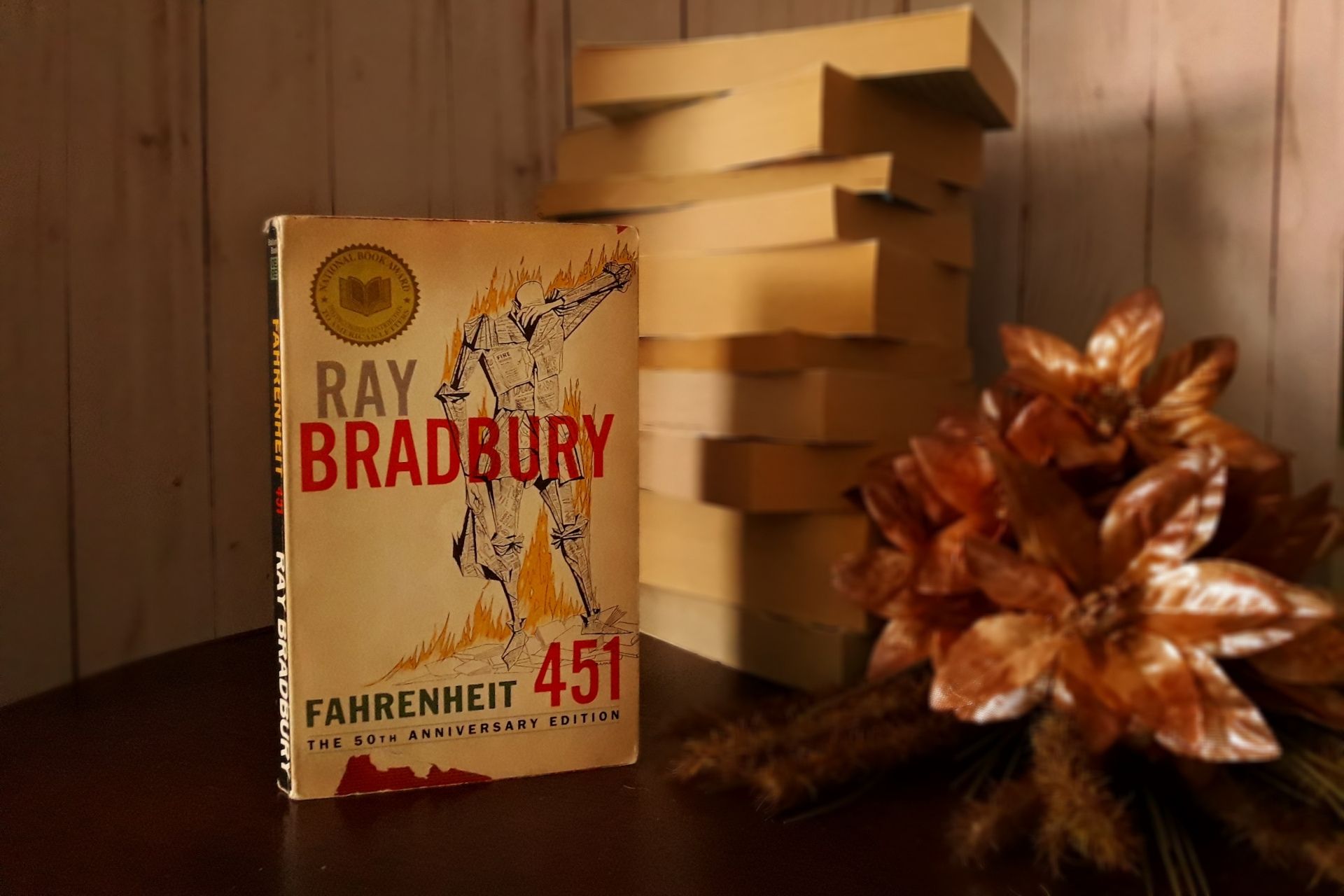SEPTEMBER 27, 2021: BLOG #45
BOOK review:
fahrenheit 451 by ray bradbury
Disclaimer: The information you are about to read is based off of my own opinions. Not intended to be taken as professional advice. Not a sponsored post. Just for fun to read and to maybe open up your mind to something new. Enjoy and thanks for taking the time to read my post!
*Content contains themes of suicide, murder, abortion
“That small motion, the white and red color, a strange fire because it meant a different thing to him. It was not burning. It was warming.”
Fahrenheit 451 By Ray Bradbury
ISBN: 978-0345342966
Page Count: 190 (slim and soulful)
Genre: literature, dystopian, drama, philosophical, science fiction
Book Bites: 3 Sentence Intro About What This Story Is
Guy Montag never once before questioned his job as a fireman, feeling content in the burning of books and in starting fires. Until he came across the girl who lives next door to him, Clarisse McClellan, who talked of times when books were highly regarded and not burned and of a society that was very different from the world that Montag knew of. As Montag begins to question his purpose in the world and challenges the status quo, he and a group of rejected, former scholars discreetly work towards preserving the last bit of literature that they’re able to save to continue the legacy of history’s greatest works.
*Content contains themes of suicide, murder, abortion
*As usual, to see the official book teaser/summary of this, go to anywhere books are found and read up more about what this book is about.
Now on to My Commentary (**May Contain Spoilers: Read at Your Own Risk)
I’m so excited to write this post in honor of Banned Books Week 2021 from September 26 to October 1, 2021. This year’s selection (as you’ve read from the title of the post) will be an oldey-but-goodie Fahrenheit 451 by Ray Bradbury.
Introduction to Banned Books Week
Banned Books Week is an annual celebration (since 1982) typically held on the last week of September. It is promoted by the American Library Association and Amnesty International to celebrate the freedom to read, bringing attention to historically banned or challenged books.
I will say, for those who are unfamiliar with Banned Books Week, it seems odd that some of these books that have become so commonplace in our lifetime are or have been under the banned or challenged books list. If you’re ever interested in searching up banned or challenged books, you’ll come across very familiar titles (most that you may have read in high school).
When I read through the list, I found myself thinking how silly it was to ban most, if not all, the books on the list. And I became interested in the reasons why these books hit a nerve with some people. Guess I’m an open-minded reader. I literally read anything and everything I can.
I mean, you can fall down a rabbit hole going through the banned books list and researching the reasoning behind iconic works landing on this list. It’s a very insightful experience to understand more about the norms and beliefs in society throughout history. And how censorship is still prevalent today.
First Off: Why was Fahrenheit 451 placed on the banned books list?
*This book has been placed on ALA’s (American Library Association) Top 100 Banned/Challenged Books: 2000-2009 and was challenged years after as well. Probably still banned in some places as of 2021.
From what I’ve gathered through a quick search on the internet was that those who argued to ban this book was due to the book’s inclusion of themes like suicide, murder, abortion, and vulgarity, such as the use of phrasing that took God’s name in vain.
Maybe these themes don’t seem as shocking in today’s published books because it has become more prevalent and talked about in the content we read. However, this book was originally published in 1953. So, in context with the beliefs and norms of that time, this book was considered scandalous. I mean, these topics are still considered taboo in modern times as well.
So what better way to celebrate my first ever blog post in honor of Banned Books Week than with a book about censorship and the mass burnings of books in a society where individualistic thinking is seen as a nuisance and may be punishable by law.
My Commentary – Fahrenheit 451
Most individuals (in the United States as far as I’m aware) are first introduced to Fahrenheit 451 in their high school English class. In high school, I never paid attention to anything the teachers gave me to read. I didn’t care for or appreciate it. Hell, even shunned books at a time in my life because they felt burdensome to me.
Yeah, the irony is that I grew up to be such a book lover and literary enthusiast in my adulthood. I particularly wanted to revisit books from my youth because I knew there was magic in them that I never cared to see before. Even though teachers tried to get us to appreciate these works of art. I wanted to experience the story from a more matured perspective, years after I was first introduced to Bradbury’s iconic work.
AND. I. LOVE. THIS. BOOK.
I always knew its prominence and high-acclaim weren’t grossly exaggerated. I just never experienced it for myself. Until now.
Montag’s Whole World Was Shaken Up
On the first page of Fahrenheit 451, Montag talks about his love for the fire and his satisfaction in his profession as a fireman.
“It was a pleasure to burn. It was a special pleasure to see things eaten, to see things blackened and changed.” (Oh Montag, you have no idea what a pleasure it was for the readers to watch you burn – figuratively – and change into a different person.)
Everything was as it should be. Until his whole world was turned upside down.
From the moment Clarisse, the odd but captivating neighbor, forced him to contemplate his life, identity, and situation to the lengths that Montag went to stand up for what he felt was right, I was at the edge of my seat, curious to learn his next move as he begins to defy the rules of his society.
Everything Montag knew, he began to question. Everything he had (relationships, beliefs, materials, job, safety), he lost.
And fire is the central symbol used throughout this book. Fire burns and destroys. Fire is an intense element. It cleanly disintegrates its victim, leaving nothing but a pile of ashes (a statement echoed by the firemen in the book). But through that complete destruction comes new life. Fire parallels Montag’s journey of self-discovery and awakening because he needed everything in his life to “go up in flames” as intensely and quickly as it did in order for him to be renewed as a person.
Reading about the fire, its purpose, its various stages (as you can use it for good or evil) and how it was used to illustrate the stages of progression in Montag’s character development is what made the book enchantingly poetic. Fire is emotive, passionate. And in a world where most of its inhabitants have fallen complacent, Montag’s growing passion and self-expression was a spark in a city of ashes.
Why Fahrenheit 451 Is Still As Relevant As Ever – If Not More Relevant
I empathized with the reasoning behind why Montag’s dystopian world progressed to the destruction of books and the increase of pure entertainment, mainly through television consumption. It was a well-intended reason and solid argument.
Captain Beatty:
“You must understand that our civilization is so vast that we can’t have our minorities upset and stirred. Ask yourself, What do we want in this country, above all? People want to be happy, isn’t that right? Haven’t you heard it all your life? I want to be happy, people say. Well, aren’t they? Don’t we keep them moving, don’t we give them fun? That’s all we live for, isn’t it? For pleasure, for titillation? And you must admit our culture provides plenty of these.”
People want happiness. World peace. How do they get that? Eliminate the things that make them sad: which are books, thinking, and analysis. People become happy. And therefore, peace is achieved.
But what did Montag’s world have to lose in order to achieve this “happiness” and “peace”?
Captain Beatty lectures Montag on how society has evolved to do more stuff. Be more productive. Take more action. So that there is less thinking done. So that thinking is not even necessary because you are so busy doing things. Homes include television walls with non-stop broadcasts for your pure entertainment. Amusement parks and entertainment locations to combat a potentially wandering mind.
Not too far off from how we’re living today, right? Do you find yourself always keeping busy that you never or rarely take a moment to just sit in silence (no TV, no books, no phones, no anything)? Have we become more selfish as a community because we’re always keeping busy?
Bradbury’s keen insight and chilling vision of the future is why Fahrenheit 451 still maintains its popularity and sparks much discussion.
Since this is a book review, not an analysis, I’m not going to go in-depth with the work. But let me say this, there is a ton to unpack in this book. The passages from Clarisse, Faber, Beatty, the scholars, and even Montag’s thoughts are profound and will touch your soul.
Books Encourage Empathy, A Hedonistic Lifestyle Isn’t Always Pleasurable
Books and social conversation allow for an exchange of ideas and in turn influences people to develop empathy. Without the ability to share diverse viewpoints, we see how some individuals in Montag’s world act with violence, murder, selfishness and indifference. And society becomes stagnant.
This world where the individuals see books and knowledge as a source of sadness so they try to be rid of it. But ridding yourself of sad or difficult topics reduces your ability to be human and to empathize. Ohhhhhh yeah, I’m going there. Sadness, challenges and heartbreak are important in our lives to help us learn and grow. Being rid of it, as beautiful as it may sound, is a big mistake.
Sure, who wouldn’t want a life where you’re constantly fed entertainment, encouraged to engage in hedonistic behaviors, to be happy and carefree? But there are also very concerning downsides to this type of lifestyle.
We see that especially depicted through Mildred’s character (Montag’s wife). She’s in a constant dazed state. No purpose. No thought. Just a zombie going through the motions, consuming whatever junk was presented on the TV screen and constantly wearing earphones. She doesn’t have any compassion for Montag, and the conversations he holds with her feels one-sided. He even begins to question how much he knows her or if he would miss her if she was gone. Mildred doesn’t even realize if she intended to overdose on pills or if it was an accident. The medics reveal to Montag how frequently they get calls each day about attending to another person who has overdosed on pills. And what’s frightening is their lack of concern about this issue, thinking it’s a completely normal part of their world to be handling overdose cases at this frequency.
They just numb any pain, sadness, or inconvenience through pills or entertainment. Never taking a moment to reflect on what the real issue is. Again, sound familiar in today’s world?
Could the World of Fahrenheit 451 Become Our Future Reality?
I was reading up a little about Bradbury’s inspiration for writing this book. Montag’s world may be considered dystopian, a fictional future that seems unimaginable. But actually there have been mass book burnings throughout history (i.e. Nazi book burnings of Jewish scholars, writers, thinkers, etc., the destruction of the Library of Alexandria in ancient Egypt, to name a few).
Personally for me, it’s a frightening and heart-wrenching concept to imagine a world where books are burned. Because (bear with me since I sound a little insane saying this) I regard books as alive. I feel a soul and personality to a book. They capture the essence of the writer within its pages so much that they are like a living being themselves. So to burn this object, it’s like murdering a living being.
Well as Montag shifts from enjoying his job as a fireman to being horrified by it, he starts to regret contributing to its destruction, feeling more of an emotional involvement in the massacre.
In comfort, one of the scholars Montag meets points out that just because the physical object is gone, doesn’t mean the message it carries disappears too. He also mentions how there will be times where censorship and book burnings occur. After that books will be written again and praised. Then more burnings. Then comes more written works. So long as someone cares enough to pass the message along over centuries, the book’s contents will live on. The cycle continues.
So don’t fret. If we ever come across a reality like Montag’s world, as long as there are those who care enough to preserve the messages of iconic works, they will continue to outlive us. Nobody can truly eliminate ideas that touch humanity so deeply.
Final Thoughts
Part of Bradbury’s argument in Fahrenheit 451 was about TV and other mass media taking over and books being pushed to the side. Not much different from an argument Makishima made about the technologically advancing society when he argued with his partner-in-crime, Choe Gu-Sung, to experience a physical book not an e-book. Because there is an unmatched experience you get when your senses are engaged while reading a physical book vs a sort of detachment from staring at a screen to read an e-book (yeah, had to sneak in that Psycho-Pass reference haha).
It’s interesting to revisit these topics 68 years later from when Fahrenheit 451 was first published in 1953. I’m very grateful to find that despite fears of books losing popularity or eventually becoming obsolete with the increase of technology and mass media consumption, books and literature are still very popular today.
I hope books will survive for many centuries to come. Especially because of book-lovers like you and me!
Hope you get the chance to celebrate Banned Books Week and pick up a banned or challenged book as your next read!
Check out this book if it piques your interest. Hope you enjoy it as your next read or a re-read!
And remember, “Every story is worth the read. Someone (some poor, overworked, ink-stains-on-the-clothes lovely soul) took the time to write it.”
Affiliate Link
At no additional cost to you, please consider supporting What Makes You Curious by using the affiliate link (to the right) to make your purchase! We earn a small commission from these links. Thanks for the support, fellow reader!



